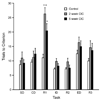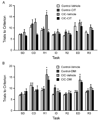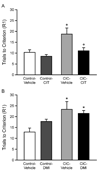A cognitive deficit induced in rats by chronic intermittent cold stress is reversed by chronic antidepressant treatment
- PMID: 20149267
- PMCID: PMC2924942
- DOI: 10.1017/S1461145710000039
A cognitive deficit induced in rats by chronic intermittent cold stress is reversed by chronic antidepressant treatment
Abstract
We have previously reported that 14-d chronic intermittent cold (CIC) stress induced a cognitive deficit in reversal learning on the rat attentional set-shifting test. This effect may be related to dysregulation of 5-HT function in orbitofrontal cortex, as a model of cognitive dysfunction in depression. To test the ability of chronic antidepressant drug treatment to reverse the cognitive deficit induced by CIC, it was first necessary to assess the temporal characteristics of the CIC-induced cognitive deficit. Thus, in the first experiment, we assessed the duration of the cognitive deficit following 2-wk CIC stress. Replicating previous experiments, CIC induced a reversal learning deficit tested 3 d after the last cold exposure. However, cognitive performance of CIC-stressed rats was no different from unstressed controls when tested 7, 14 or 21 d after termination of the stress treatment. We next compared behaviour 3 d after 2-wk CIC to that seen 3 d after 5-wk CIC, and found similar deficits in reversal learning. Thus, in the final experiment, antidepressant drug treatment was initiated after 2-wk CIC stress, and was maintained for 3 wk, concurrent with the continuation of CIC stress. Both chronic and acute treatment with the selective serotonin reuptake inhibitor, citalopram, but not the norepinephrine reuptake blocker, desipramine, reversed the cognitive deficit induced by CIC stress. Thus, this stress-induced cognitive deficit may be a useful model for cognitive deficits related to prefrontal cortical hypoactivity in depression, and for investigating neurobiological mechanisms underlying the beneficial effects of chronic antidepressant drug treatment.
Conflict of interest statement
The authors have no conflicts of interest to report, nor any involvement to disclose, financial or otherwise, that may bias the conduct, interpretation or presentation of this work.
Figures





Similar articles
-
5-HT2A receptors in the orbitofrontal cortex facilitate reversal learning and contribute to the beneficial cognitive effects of chronic citalopram treatment in rats.Int J Neuropsychopharmacol. 2012 Oct;15(9):1295-305. doi: 10.1017/S1461145711001441. Epub 2011 Oct 19. Int J Neuropsychopharmacol. 2012. PMID: 22008191 Free PMC article.
-
Chronic intermittent cold stress and serotonin depletion induce deficits of reversal learning in an attentional set-shifting test in rats.Psychopharmacology (Berl). 2009 Jan;202(1-3):329-41. doi: 10.1007/s00213-008-1224-6. Epub 2008 Jun 30. Psychopharmacology (Berl). 2009. PMID: 18587666 Free PMC article.
-
Ketamine Corrects Stress-Induced Cognitive Dysfunction through JAK2/STAT3 Signaling in the Orbitofrontal Cortex.Neuropsychopharmacology. 2017 May;42(6):1220-1230. doi: 10.1038/npp.2016.236. Epub 2016 Oct 17. Neuropsychopharmacology. 2017. PMID: 27748739 Free PMC article.
-
Effects of stress on behavioral flexibility in rodents.Neuroscience. 2017 Mar 14;345:176-192. doi: 10.1016/j.neuroscience.2016.04.007. Epub 2016 Apr 9. Neuroscience. 2017. PMID: 27066767 Review.
-
Attentional set-shifting in rodents: a review of behavioural methods and pharmacological results.Curr Pharm Des. 2014;20(31):5046-59. doi: 10.2174/1381612819666131216115802. Curr Pharm Des. 2014. PMID: 24345263 Review.
Cited by
-
Effects of chronic stress on cognitive function - From neurobiology to intervention.Neurobiol Stress. 2024 Sep 2;33:100670. doi: 10.1016/j.ynstr.2024.100670. eCollection 2024 Nov. Neurobiol Stress. 2024. PMID: 39295772 Free PMC article. Review.
-
A novel role for brain interleukin-6: facilitation of cognitive flexibility in rat orbitofrontal cortex.J Neurosci. 2014 Jan 15;34(3):953-62. doi: 10.1523/JNEUROSCI.3968-13.2014. J Neurosci. 2014. PMID: 24431453 Free PMC article.
-
5-HT2A receptors in the orbitofrontal cortex facilitate reversal learning and contribute to the beneficial cognitive effects of chronic citalopram treatment in rats.Int J Neuropsychopharmacol. 2012 Oct;15(9):1295-305. doi: 10.1017/S1461145711001441. Epub 2011 Oct 19. Int J Neuropsychopharmacol. 2012. PMID: 22008191 Free PMC article.
-
Stress modulation of cognitive and affective processes.Stress. 2011 Sep;14(5):503-19. doi: 10.3109/10253890.2011.596864. Epub 2011 Jul 26. Stress. 2011. PMID: 21790481 Free PMC article. Review.
-
Perseveration and Shifting in Obsessive-Compulsive Disorder as a Function of Uncertainty, Punishment, and Serotonergic Medication.Biol Psychiatry Glob Open Sci. 2023 Jul 13;4(1):326-335. doi: 10.1016/j.bpsgos.2023.06.004. eCollection 2024 Jan. Biol Psychiatry Glob Open Sci. 2023. PMID: 38298803 Free PMC article.
References
-
- Anisman H, Zacharko RM. Behavioral and neurochemical consequences associated with stressors. Annals of the New York Academy of Science. 1986;467:205–225. - PubMed
-
- Beats BC, Sahakian BJ, Levy R. Cognitive performance in tests sensitive to frontal lobe dysfunction in the elderly depressed. Psychological Medicine. 1996;26:591–604. - PubMed
-
- Beck AT. Cognitive therapy and the emotional disorders. New York: Int. Univ. Press; 1976.
-
- Beck AT. The current state of cognitive therapy: A 40-year retrospective. Archives of General Psychiatry. 2005;62:953–959. - PubMed
-
- Beck AT, Brown G, Steer RA, Eidelson JI, et al. Differentiating anxiety and depression: A test of the cognitive content-specificity hypothesis. Journal of Abnormal Psychology. 1987;96:179–183. - PubMed
Publication types
MeSH terms
Substances
Grants and funding
LinkOut - more resources
Full Text Sources
Medical
Miscellaneous

